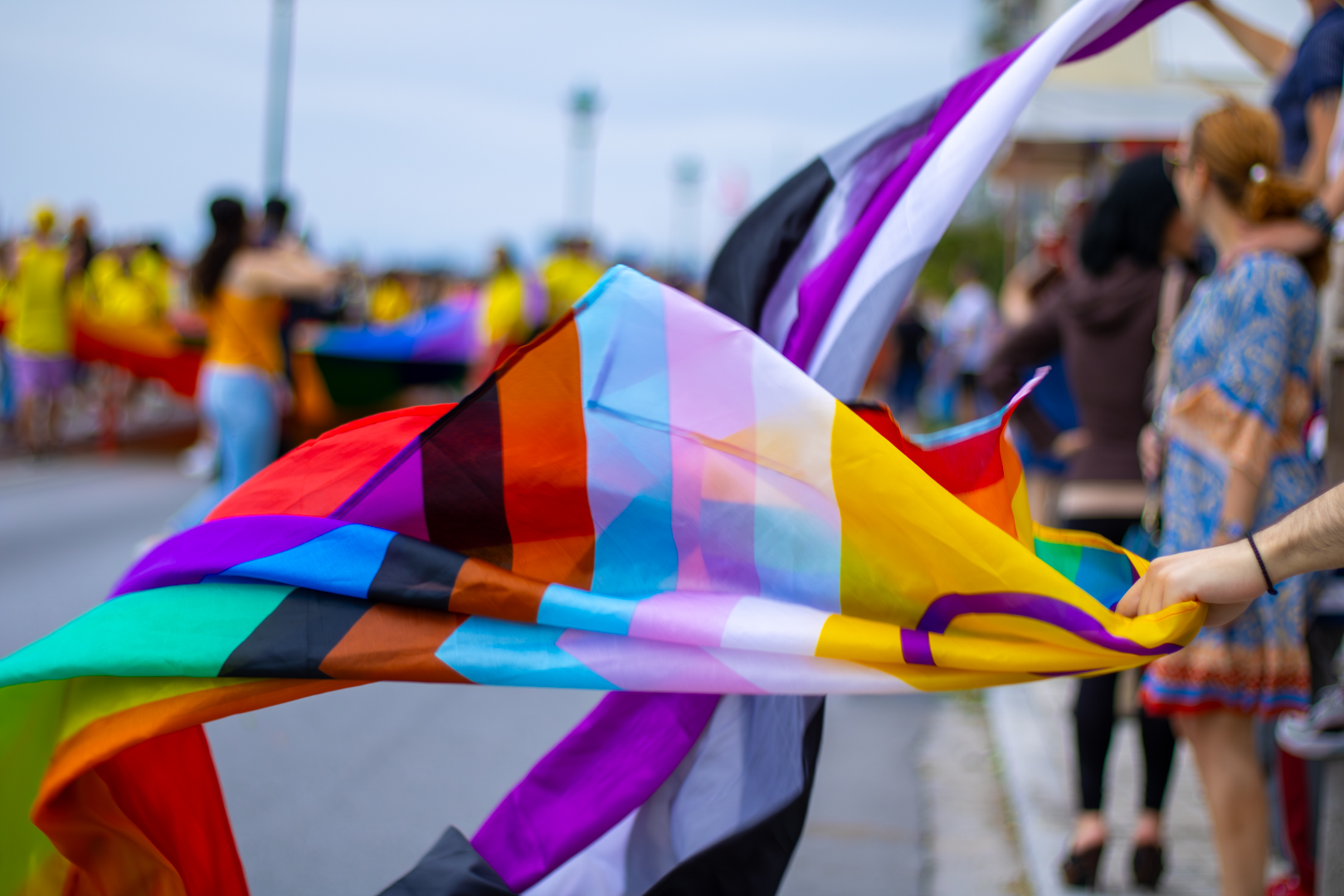Three weeks after Greece became the first Orthodox Christian country to legalize same-sex marriage, Thanasis McMorait opened social media and found videos of shocking anti-LGBTQ violence: a mob of some 150 people were chasing down two trans people in a central area of Thessaloniki, the country’s second-largest city.
On March 9, the crowd set upon the victims in downtown Thessaloniki’s Aristotelous Square. The assailants reportedly physically assaulted and threw bottles at the trans individuals. When the victims ducked into a restaurant to escape the violence, the attackers banged on the windows and taunted them. Police subsequently arrested 21 people over the incident, including 11 minors.
McMorait, a drag queen and queer performer who lives in Thessaloniki, quickly hopped into action. McMorait saved the videos, which people in the mob, the victims, and witnesses had recorded, and shared them widely online.
The videos spread across the internet, and the Greek press soon picked up the story. But McMorait saw the violence, in part, as a product of media-hyped controversy over move to legalize the same-sex marriage. “The way the Greek press and Greek society handled the issue of the bill on same-sex marriage has created very, very strong anger in this conservative core that exists in Greece, which is quite strong, and this anger is also [taken out] on queer people,” McMorait said.
“We Only Have One Another”
The day after the attack, protesters gathered in Thessaloniki to rally against anti-LGBTQ violence. The demonstration brought out LGBTQ activists, leftists, anarchists, and others. According to McMoirat, the rally-goers sought to send three messages.
“The first was that ‘we only have one another,’” McMorait explained. “It’s something we often say to each other because we can’t unfortunately rely on any government, any state, any institution when it comes to our lives. We have only our brothers and sisters. The second message was to the fascists that they cannot do this thing. We will not be afraid to walk around — they will be the afraid ones in Thessaloniki.”
The third message, he said, went out to those who haven’t taken a stand against anti-LGBTQ violence. “They have to decide whether they stand with the perpetrators or with the individuals who are fighting for their existence and their lives,” he added.
But even as thousands of demonstrators rallied in solidarity with the victims, a group of some 50 masked men attacked the protest.
“A Time of Intense Hate Speech”
The attack wasn’t an anomaly. The Racist Violence Recording Network (RVRN), an umbrella of civil society groups that tracks hate crimes, says more than half of all hate crimes targeted LGBTQ people and their advocates in 2022.
In a statement after the Thessaloniki assault, RVRN explained that the attack came “at a time of intense hate speech against LGBTQI+ people in the context of the debate and recent adoption of the law legalizing same-sex marriage.”
RVRN added that “senior politicians and members of the parliament, as well as … the media and representatives of the church in the country” express such hate speech in “the public discourse.”
They have to decide whether they stand with the perpetrators or with the individuals who are fighting for their existence and their lives.
– Thanasis McMorait
George Stamatis, who serves on the Greek parliament’s Special Standing Committee on Youth Equality and Human Rights, said the recent attack proves that “diversity happens to still not be accepted and tolerated by some extreme elements of our society.”
Stamatis, who is also a member of the Parliamentary Assembly of the Committee on Equality and Non-Discrimination at the Council of Europe, insisted that Thessaloniki remains “a multicultural city” and that “this event” will not define the community. Fighting against anti-LGBTQ sentiment and violence means that Greece needs “to look at what happens in the families [and] what happens in education,” he added.
Far-Right Parties
Greece currently has one of its largest shares of far-right parties in the Hellenic Parliament in the country’s history. Three far-right parties — the Spartans Party, Niki, and the Greek Solution — entered the parliament after June 2023 elections, altogether securing more than 12% of the vote. New Democracy, the conservative ruling party, gained some 40% of the vote in those elections, and some of its members have railed against the LGBTQ community.
When the Hellenic Parliament voted on same-sex marriage, 176 legislators voted in favor. Some 76 voted against the bill, including 20 New Democracy lawmakers, and another 46 abstained from the vote.
Stamatis noted that Thessaloniki will host EuroPride in late June. That event will celebrate the LGBTQ community, Stamatis said, adding: “I think this will be a good answer to all those who want a closed society which does not allow all citizens to have the same rights.”
Earlier this month, the city also held the annual Thessaloniki Documentary Festival, and this year’s festival gave a special tribute to queer cinema. In the leadup, posters of some of the festival’s films — Elina Psikou’s “Stray Bodies,” for instance — stirred backlash from far-right and religious groups. The “Stray Bodies” posters depicted a nude pregnant woman on a cross.
Parliamentarian Komninos Delveroudis, a member of the far-right Niki party, and Metropolitan Bishop Filotheos publicly called for the censorship of the poster. Filotheos later wrote to festival director Elise Jalladeua and clarified that his request only applied to the poster and not the film itself.
“Horror and Indignation”
On March 10, Jalladeua issued a written response that lamented that the world “seems to be going backwards,” adding: “Violence, attacks on women, [and] femicides are on the rise.” She also alluded to the anti-trans attack in the city the day before. “Just yesterday in Aristotelous Square, a stone’s throw from our festival headquarters, we witnessed with horror and indignation a vicious and violent attack on two transgender people, who were rescued purely by chance,” Jalladeua wrote.
“If one’s views do not preach hatred and do not call for illegal acts, if they do not threaten the fundamental principles of freedom and democracy and if they do not violate existing laws, then we ought to listen to them in the context of an accepting and loving society,” Jalladeua went on.
At the same time, the anti-trans violence demonstrates that the struggle for an inclusive society has collided with the opposition of religious groups, hardline conservatives, and far-right extremists. But some critics have also taken aim at the police’s response to such attacks, pointing to similar violent incidents in the past.
“Left Without Justice”
In September 2018, the case of LGBTQ activist and community organizer Zak Kostopoulos, who often went by the drag name Zackie Oh, made global headlines. Kostopoulos had entered a jewelry store in Athens. Two men, including the shop owner, later claimed Kostopoulos had tried to rob the business. Security camera footage showed the men beating Kostopoulos. When police officers arrived and handcuffed Kostopoulos, some also beat the already injured activist. Kostopoulos died before they arrived at the police station.
Kostopoulos’s family insisted his death amounted to a hate crime. A court later found the two men who beat Kostopoulos guilty of causing fatal bodily harm, but it also delivered a split decision that ruled the four police officers charged in relation as not guilty.
Human rights groups and watchdogs including Amnesty International condemned the court’s decision to not convict the officers. “It beggars belief that despite footage showing police using unnecessary force to arrest Zak while he lay dying on the ground, no officer has yet to be held to account,” Glykeria Arapi, director of the watchdog’s Greece chapter, said in a statement. Arapi added that the decision “is yet another example in Greece where victims of unnecessary use of force and their families are left without justice.”
“Transphobia Is Global”
Regarding criticism of the police’s approach to anti-LGBTQ violence, George Stamatis explained that police should adequately probe “any complaint by any citizen about anything.” Stamatis added that authorities “must intervene swiftly but with such a degree of readiness that the victim is not subject to discrimination on the part of the police, either.”
As far as Thanasis McMorait is concerned, anti-LGBTQ discrimination and “violence is now gaining visibility because such incidents are … uploaded on social media, either as something to be applauded — which is a huge problem — or by people who want to condemn it.”
But the way McMorait sees it, Greece’s struggle for LGBTQ inclusion and against homophobia and transphobia is part of a worldwide effort to fight bigotry and discrimination. From the United States to Europe, McMoirat said, “We cannot just live with the problem of our own micro-community. We have to realize that the problem of transphobia is a global thing and [that] the need to fight against it is also expanding.”




















